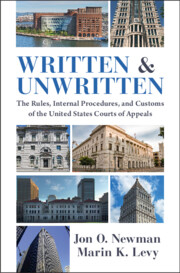
- Publisher:
- Cambridge University Press
- Online publication date:
- November 2024
- Print publication year:
- 2024
- Online ISBN:
- 9781009426169

Although the thirteen United States Courts of Appeals are the final word on 99 percent of all federal cases, there is no detailed account of how these courts operate. How do judges decide which decisions are binding precedents and which are not? Who decides whether appeals are argued orally? What administrative structures do these Courts have? The answers to these and hundreds of other questions are largely unknown, not only to lawyers and legal academics, but by many within the judiciary itself. Written and Unwritten is the first book to provide an inside look at how these courts operate. An unprecedented contribution to the field of judicial administration, the book collects the differing local rules and internal procedures of each Court of Appeals. In-depth interviews of the Chief Judges of all thirteen circuits and surveys of all Clerks of Court reveal previously undisclosed practices and customs.
‘This book, authored by an eminent federal circuit judge and an expert academic, fills a conspicuous void when it comes to understanding how our federal appellate courts work in practice. Long overdue, it provides a blueprint for both the legal practitioner and those interested in learning more about the practical considerations that define appellate advocacy. On my bookshelf for sure.’
Kenneth R. Feinberg - Esq., former Administrator of the September 11, Victim Compensation Fund
‘The judicial administration ‘dream team’ of Judge Jon O. Newman and Duke Law Professor Marin K. Levy have discovered and described the written and unwritten practices and customs of the nation's 13 courts of appeals. Appellate lawyers, judges, and scholars will be delighted to have this compilation of practices and customs, many of which vary considerably from circuit to circuit.’
David F. Levi - Dean Emeritus, Duke University Law School, and former President, American Law Institute
‘The book means that lawyers can more readily find out how to present their cases in different circuits. It means that the judges of different circuits can far more easily learn how their counterparts elsewhere in the federal system organize the judicial appellate task. And it means knowledge will bring about improvement as judges in each circuit learn how others handle similar problems. The result: a judicial system that works better for those whom it serves.’
Stephen Breyer - US Supreme Court (retired) from the Foreword
 Loading metrics...
Loading metrics...
* Views captured on Cambridge Core between #date#. This data will be updated every 24 hours.
Usage data cannot currently be displayed.
Accessibility compliance for the PDF of this book is currently unknown and may be updated in the future.